Israel Cannot Fight A Long-Term War Against Hamas - IRGC Commander
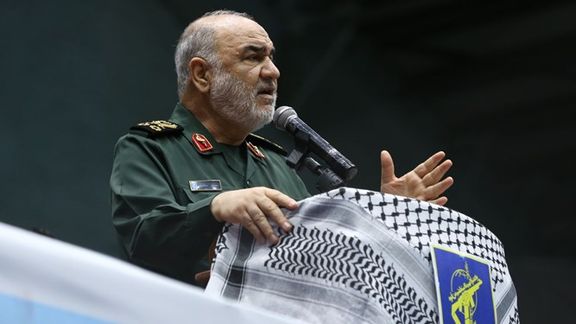
The commander of Iran’s Revolutionary Guard has claimed that Israel is unable to continue its war against Tehran-backed Hamas in the long-term.

The commander of Iran’s Revolutionary Guard has claimed that Israel is unable to continue its war against Tehran-backed Hamas in the long-term.
Speaking two months after the October 7 massacre of Israelis sparked the conflict with the militant group in Gaza, Hossein Salami said on Wednesday: "The Zionist regime will not be able to handle a long-term war.”
The IRGC commander claimed that the ongoing conflict which has claimed thousands of lives in Gaza “is primarily fueled by [Israeli prime minister Benjamin] Netanyahu's personal motivations”.
Salami also said he believed that only a fraction of the resistance's capabilities against Israel has been activated so far in the conflict.
The comments come as Israel has renewed its commitment to "destroy the Iranian proxy in Gaza" and also deter other Iran-backed groups, including Hezbollah in Lebanon.
Israeli government spokesman Eylon Levy told Iran International on Tuesday that the military offensive aims to combat the perpetrators of the October 7 massacre rather than escalate into a regional conflict.
The conflict erupted following Hamas’s invasion of Israel on October 7, when thousands of militia members took the lives of around 1,200 Israelis and other nationalities, and took hundreds of hostages back to Gaza. Retaliatory attacks in Gaza have claimed over 15,000 lives, with hundreds of thousands displaced. Israel's efforts to uproot Hamas have faced the challenge of the Islamist group’s strategic use both of civilians as human shields and an extensive underground tunnel network spanning around 500 kilometers.
Salami also commented on the deployment of aircraft carriers to the region, in a veiled comment targeted at the United States, stating, "Aircraft carriers are being sent to the region, serving as symbols of the power of an empire navigating the world's waters, acting as tools for penetration and political control. However, when they reach Iran, they lose their political significance and are forced to be influenced."
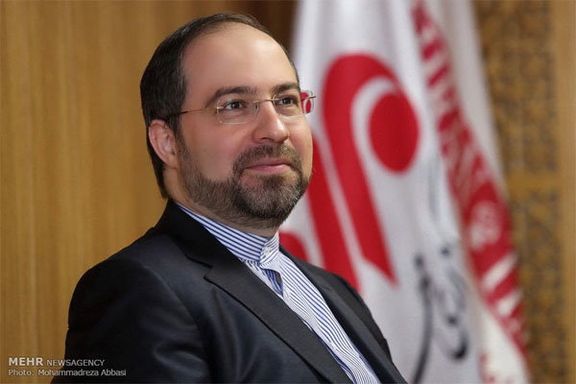
A former high-ranking Iranian government official found living in Toronto is now facing deportation by the Canadian authorities.
As reported by Global News, officials in Canada have initiated proceedings against Salman Samani, 42, who is the subject of sanctions imposed a year ago against members of Iran's hardline regime.
Samani held the position of Iran's deputy minister of interior during Hassan Rouhani's term as president.
The Canada Border Services Agency has formally urged the Immigration and Refugee Board to conduct a hearing for Samani, potentially resulting in his expulsion from the country. Anna Pape, spokesperson for the Refugee Board, confirmed that Samani's case “was referred for an admissibility hearing on November 10, 2023.”
The deportation is in line with sanctions implemented in November 2022, preventing senior members of the Iranian regime from entering Canada.
The measures were imposed after Iran's morality police killed Mahsa Amini for defying hijab laws. Amini's death garnered international condemnation and became a poignant symbol of resistance against the repression of women under Iran's clerical regime.
In response, Canada classified Iran's government as a regime involved in "terrorism and systematic and gross human rights violations," leading to the effective exclusion of tens of thousands of Iranian officials and Islamic Revolutionary Guard Corps members from entering the country.
Canada severed diplomatic ties with Iran in 2012 due to concerns related to its pursuit of nuclear weapons and support for terrorist organizations including Hamas.

Oberlin College has placed Iran’s former UN ambassador, Mohammad Jafar Mahallati, on indefinite leave from his teaching position after a campaign by Iranian Americans.
Oberlin College spokeswoman Andrea Simakis told Iran International, "On November 28, Professor Mahallati was placed on indefinite administrative leave." She declined to provide reasons for his removal.
According to a statement released on Wednesday, the Alliance Against Islamic Regime of Iran Apologists (AAIRIA) organization announced that “today marks a pivotal development in their campaign. Mohammad Jafar Mahallati, formerly referred to as the 'professor of peace,' appears to have been placed on permanent administrative leave from his role in the Religion Department at Oberlin College. This action comes as a result of tireless advocacy and stark revelations about Mahallati's involvement in covering up human rights abuses and his antisemitic rhetoric, underscoring a long-awaited acknowledgment of the victims' suffering.”
Mahallati reportedly covered up the mass murder of 5,000 Iranian political prisoners in 1988 when he was the regime’s ambassador to the UN.
AAIRIA also disclosed new sexual misconduct accusations against Mahallati during his time as a teaching assistant at Columbia University in the late 1990’s. Iran International was given a copy of a court document showing a settlement in the case.
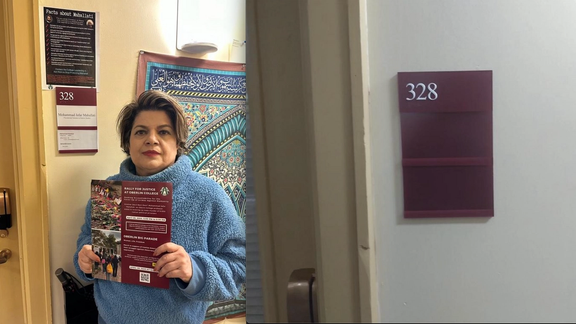
“AAIRIA contacted the school [Oberlin College] after unearthing court documents demonstrating that Mahallati allegedly forced a graduate student into an ‘emotionally abusive’ sexual relationship in exchange for ‘academic benefits,’ while teaching courses at Columbia University.”
AAIRA said that “Sources inside Oberlin College told AAIRIA that Mahallati was placed on permanent leave. His nameplate was removed from his office door, and references to Mahallati were scrubbed from the college’s website, including a ‘factsheet’ that defended the professor from accusations that he covered up crimes against humanity. “
When Iran International clicked on Mahallati’s profile on Oberlin College’s website, it now read “Aw, nuts… Sorry we can't find your page. Let’s try to get you back on track.”
AAIRIA sent Iran International pictures of Mahallati’s office in the religion department, showing his office before and after his ouster. His nameplate no longer appears next to his door as of December 5 when the most recent photograph was taken.
Members of the AAIRA campaign, including its lead organizer, the California-based human rights activist, Lawdan Bazargan, weighed in on Mahallati’s departure.
“It's disheartening that it took Oberlin College three years to take this crucial step,” said Bazargan, whose brother Bijan was executed in the 1988 killings. “We call upon Oberlin College to not only take these actions but also to meet with the family members of the victims to hear their voices and experiences,” she added.
Bazargan continued “Furthermore, we urge the college to demonstrate its commitment to justice by creating a memorial for the victims. This is not just about accountability; it's about honoring the memory of those who suffered in the 1980s and the 1988 massacre and ensuring that such atrocities are never forgotten."
“This development, however, should not be mistaken for swift or decisive action by Oberlin College,” said Fatemeh Pishdadian of AAIRIA, whose parents were tortured and executed by Iran’s regime in 1981. “It reflects a belated response to pressing demands for truth and justice which continued for years, echoing our call that those who shield the actions of oppressive regimes have no rightful place in our academic institutions.”
Investigative journalist Ben Baird, who uncovered the sexual harassment case against Mahallati, told Iran International “Mahallati isn’t just involved in human rights abuses and possible antisemitic teachings – he was also the defendant in a lawsuit alleging a predatory sex-for-grades relationship with a graduate student at Columbia University, where Mahallati taught courses in the 1990s. “
Baird added “Columbia settled the case with the plaintiff, Vida Shammas, for an undisclosed amount. However, the case files detailing the sordid nature of the affair, including Mahallati’s alleged attempts to blackmail Shammas if she told anyone about the quid pro quo, sat buried in government storage for decades, obstructing access to evidence of Mahallati’s potential academic malpractice.”
Mahallati did not immediately return Iran International press queries sent to his two Oberlin College emails and his personal email.
Frieda Fuchs, an Oberlin-based member of AAIRA, who has taught at the college, told Iran International “Oberlin College exhibited a significant oversight in appointing Mahallati to a tenure-track position in the Religion Department. Prior to his hiring, the institution should have considered Mahallati's role in concealing the 1988 prison massacre as a UN Ambassador, his support for UN resolutions condemning Israel, his failure as UN Ambassador to condemn the persecution of Jewish and Baha’i minorities in Iran, and his endorsement of the fatwa against Salman Rushdie.
She went on to say, “Additionally, Mahallati sought to use diplomatic immunity in 1998 to evade sexual harassment charges at Columbia University, resulting in a settlement. All this information, publicly accessible, should have warranted appropriate action.”
AAIRIA wrote that “We demanded Mahallati’s immediate termination after an Amnesty International report identified him as a chief conspirator in the Iran regime’s attempts to hide the 1988 massacre of an estimated 5,000 political prisoners. In late September, the Department of Education Office of Civil Rights revealed that it was investigating a complaint that Mahallati taught students ‘support for Hamas and terrorism’ as part of a larger probe into anti-Semitism on Oberlin’s campus.”
AAIRA, a broad-based coalition of families of the 1988 massacre victims, human rights activists, and concerned citizens, noted in its statement that it demands that Oberlin College “clarify the rationale behind Mahallati's leave and initiate an independent investigation into the oversight of his hiring, given his alleged complicity in the 1988 massacre. The college must also ensure that Mahallati is denied any future benefits, pensions, or favorable references stemming from his work at Oberlin College.”
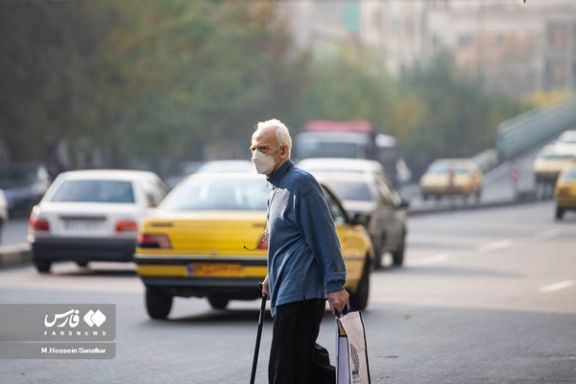
The use of a low-grade fuel by power plants amid a gasoline shortage in Iran is linked to severe harm to public health and even fatalities, a parliamentarian says.
Morteza Khatami, a member of the parliamentary Health Committee, warned the continued use of mazut (a heavy, low-grade fuel oil) has seen a rise in infections, outpatient visits, hospitalizations and deaths attributed to pollutants.
The Iranian authorities have responded to the surge in air pollution by closing schools in Tehran and several other provinces. In the capital, primary and secondary schools have been closed since Monday. Vulnerable groups including children, pregnant women, and individuals with heart or lung conditions have been advised to wear masks in public and to avoid outdoor activities.
Government officials attribute the pollution crisis in Tehran to industrial emissions and the gases from vehicle exhausts and fossil fuel burning. However, the use of mazut is also said to be a significant contributor to air pollution, particularly in industrial settings.
Yet Dariush Golalizadeh, the head of the National Center for Air and Climate Change, claimed that there is no mazut burning in Tehran's power plants and denied it is a factor in the air pollution crisis.
Iran has been facing a notable gasoline shortage since last summer, prompting refineries to bulk out the fuel's volume with other substances. The resultant non-standard gasoline contains harmful additives and has significantly contributed to the air pollution crisis in the country.
A recent report by the news outlet Etemad highlighted that Tehran experienced only two clear days in the last year, during which there has been a notable increase in emergency room visits by residents due to polluted air. Iran currently ranks as the sixth-highest global contributor to greenhouse gas emissions, following China, the United States, India, Japan, and Russia.
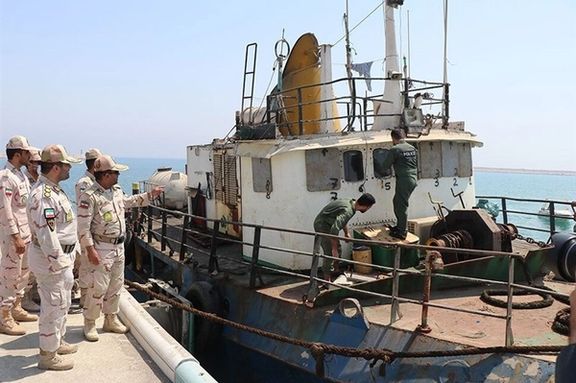
Iran's Revolutionary Guards' media say IRGC Navy has intercepted and seized ships smuggling more than 4.5 million liters of fuel.
The operation resulted in the detention of 34 foreign crew members.
The vessels are said to be small local ships rather than conventional international tankers.
The nationalities of the foreign sailors and the countries to which the vessels belong were not disclosed.
The total of smuggled fuel seized is under 30,000 barrels and a relatively small amount by oil trading standards.
Iran has some of the lowest fuel prices in the world due to extensive subsidies and the devaluation of the rial. The regime is combating widespread fuel smuggling, both through land routes to neighboring countries and maritime channels to Gulf Arab states.
Commander Ali Ozmaee of the Fifth Naval Region of the Revolutionary Guard provided details of the seizure, saying that one vessel, carrying 2,280,000 liters of fuel and crewed by 13 foreigners, was apprehended south of Abu Musa Island. A second ship, with 21 foreign crew members and transporting 2,300,000 liters of fuel, was also seized by Revolutionary Guard forces.
The incident follows a pattern of the Revolutionary Guard's involvement in intercepting foreign ships in the Persian Gulf. The United States had previously reported that Iran engaged in aggressive actions against over 20 ships in the region within the past two years.
In a separate incident on July 7 of this year, the Revolutionary Guard claimed the seizure of a vessel with 12 foreign crew members carrying 900 tons of smuggled fuel.

Amnesty International has released a report exposing the Iranian government's use of rape and sexual violence as tools of repression in last year’s protests.
The 120-page report titled “They violently raped me: Sexual violence weaponized to crush Iran’s Woman, Life, Freedom uprising,” refers to the popular revolt against the Islamic Republic sparked by the death of 22-year-old Mahsa Amini at the hands of the so-called morality police. The recurring nationwide protests that started in September 2022 lasted for months until the regime crushed the dissent by killing about 600, arresting over 22,000 and hanging some of protesters.
The new report published Wednesday documents in detail “the harrowing ordeals of 45 survivors, including 26 men, 12 women and seven children, who were subjected to rape, gang rape and/or other forms of sexual violence by intelligence and security forces following their arbitrary arrest for challenging decades of oppression and entrenched gender-based discrimination.”
Sixteen of the 45 survivors whose cases were documented in the report were raped, including six women, seven men, a 14-year-old girl, and two boys aged 16 and 17. Six of them – four women and two men – were gang raped by up to 10 male agents.
The victims faced sexual violence at the hands of various branches of the Iranian security apparatus, including the Revolutionary Guards, Basij paramilitary force, Intelligence Ministry, and different police branches in more than half of Iran's 31 provinces. The survivors' testimonies paint a disturbing picture of rape and sexual violence, with victims subjected to unimaginable brutality, including the use of wooden and metal batons, glass bottles, hosepipes, and even electric shocks.
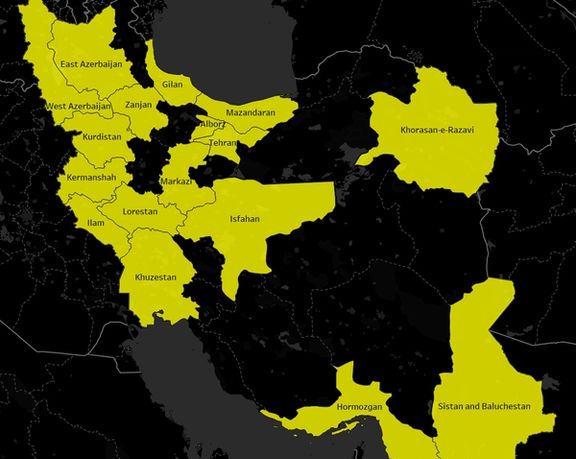
Criminology expert Moein Khazaeli said in an interview with Iran International that the report provides damning evidence that sexual violence is systematic in Iran. The perpetrators are either directly ordered by superiors to engage in such acts or their actions are intentionally ignored by the government, indicating that “sexual violence is used as tool for repression.”
Despite earlier reports of a pattern of widespread sexual violence as a means of torture and intimidation, the Iranian authorities have never charged or prosecuted anyone for such crimes. The report highlighted that the lack of accountability has left survivors grappling with physical and psychological trauma, many unable to seek justice domestically due to the fear of reprisals.
“I used to be a fighter in life. Even when the Islamic Republic tried to break me down, I carried on. However, recently, I think about suicide a lot," said Sahar, a Baluchi woman who recounted the traumatic impact of sexual violence at the hands of security forces, who removed her clothes and touched her breasts and genitals while mocking her body and skin color and threatening her with rape.
Human rights activist Reza Akvanian told Iran International the primary force that push numerous survivors to commit suicide after their release is the profound psychological trauma inflicted by the Islamic Republic’s forces.
Another woman, Zahra, told Amnesty International that, while in a van belonging to the Special Forces of Iran’s police (yegan-e vijeh), an agent pulled down her trousers in the presence of other female detainees and raped her. She added that she witnessed another agent ordering two handcuffed women in the van to perform oral sex acts on him and, when one woman refused, he dragged her out of the van by her hair.
Amnesty International's Secretary-General Agnés Callamard emphasized how survivors have been left without recourse, trapped in a cycle of institutionalized impunity, silencing, and enduring deep physical and psychological scars, pointing to “a wider pattern in the use of sexual violence as a key weapon in the Iranian authorities’ armory of repression of the protests and suppression of dissent to cling to power at all costs.”
“Iran’s prosecutors and judges were not only complicit by ignoring or covering up survivors’ complaints of rape, but also used torture-tainted ‘confessions’ to bring spurious charges against survivors and sentence them to imprisonment or death,” Callamard stated.
Amnesty International urged the global community to stand with the survivors and pursue justice, including through supporting the extension of the UN Fact-Finding mission on Iran to ensure an independent mechanism for collecting, preserving, and analyzing evidence of crimes under international law. The rights group also urged states to initiate criminal investigations against suspected perpetrators under the principle of universal jurisdiction, stressing the need for international arrest warrants.